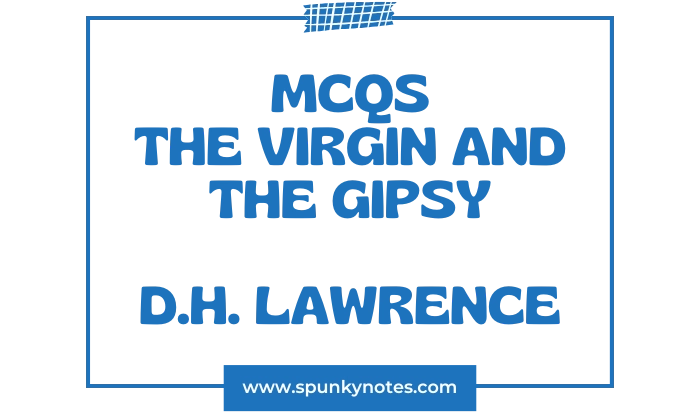

Estimated Reading Time: 19 min
The Virgin and the Gípsy MCQs
1. What caused the initial scandal involving the vicar’s family?
A. The vicar lost his faith
B. The vicar’s wife ran off with a young and penniless man
C. The vicar was accused of essay writing
D. The vicar’s house burned down
2. The Papplewick rectory was described as a rather ugly stone house located near what body of water?
A. The Papple river
B. The North Sea
C. A stagnant pond
D. The industrial canal
3. Who became the central figure in the rectory household?
A. Aunt Cissie
B. Uncle Fred
C. Granny (The Mater)
D. Lucille
4. Aunt Cissie was over forty, pale, pious, and gnawed by what internal issue?
A. Guilt
B. Financial worry
C. An inward worm
D. Hunger
5. What symbolic image did The Mater establish for the rector’s deceased/delinquent wife?
A. A pure white snowflower
B. A poisonous berry
C. A withered oak leaf
D. A bright sun
6. What name did the family sometimes use for the actual woman who had left?
A. The Bad Nettle
B. She-who-was-Cynthia
C. Arthur’s Mistake
D. The Widow
7. What “rank, evil smell” sometimes came from the squalid world to the children?
A. The smell of tobacco
B. The smell of selfishness and degraded lust
C. The smell of wet wool
D. The smell of old food
8. Who was Granny’s great rival among the younger generation?
A. Lucille
B. Aunt Cissie
C. Yvette
D. Uncle Fred
9. What were the approximate ages of Lucille and Yvette when they finally came home from school?
A. 23 and 21
B. Nearly twenty-one and nineteen
C. 18 and 16
D. 25 and 23
10. What did Yvette hope would happen to her romantically?
A. To fall violently in love
B. To marry a rich man
C. To settle down quickly
D. To avoid men altogether
11. What impression did the rectory strike the girls with upon their return?
A. Elegant and modern
B. Ugly, almost sordid, with a dank, unclean air
C. Warm and welcoming
D. Vast and intimidating
12. How was the life in the village of Papplewick characterized?
A. Glamorous and fast-paced
B. Stony and dour
C. Transient and forgiving
D. Highly cultured
13. When Yvette opened the window for fresh air, who immediately closed it, without looking at his daughter?
A. Uncle Fred
B. The Rector
C. Granny
D. Aunt Cissie
14. How did Granny physically express her “gross physical complacency” after meals?
A. She coughed loudly
B. She “rifted” (belched)
C. She snored
D. She exercised
15. What action by Yvette during tea caused Aunt Cissie’s “green rage” to fuse in her heart?
A. She insulted Granny
B. She accidentally knocked over a cup
C. She helped herself to Aunt Cissie’s cake
D. She mocked Leo Wetherell
16. Yvette suddenly saw Granny’s “stony, implacable will-to-power” and compared her to what creature hunting bees?
A. An old crocodile
B. An aged, bulging toad
C. A large wolf
D. A sleepy cat
17. What happened to the toad that Yvette watched swallowing bees?
A. It was relocated
B. It was killed by the gardener with a stone
C. It died of old age
D. It was caught by Uncle Fred
18. Who did the young people encounter on the upland lane, driving a light cart?
A. Uncle Fred
B. A gípsy man
C. The Duke
D. Lady Louth’s chauffeur
19. What word described the gípsy man’s gaze towards the occupants of the car?
A. Terrified
B. Insolent in its indifference
C. Desperate
D. Questioning
20. What feeling took fire in Yvette’s breast when she met the gípsy’s eyes?
A. Hatred
B. She realized he was stronger than she was, and didn’t care
C. Amusement
D. Maternal instinct
21. What kind of pride was evident in the male gípsy’s eyes while he watched the group?
A. The pride of the wealthy
B. The pride of the pariah
C. The pride of a loyal husband
D. The pride of a good craftsman
22. When Yvette emerged from the caravan, how was her appearance described?
A. Triumphant and joyous
B. Like a witch, silent and stooping
C. Distressed and weeping
D. Suddenly practical
23. What was the total amount that Yvette admitted to borrowing from the proceeds of Mary in the Mirror?
A. Fifteen shillings
B. Three pounds thirteen
C. Seven pounds
D. Her entire allowance
24. The rector feared Yvette was developing the tainted qualities of whom?
A. Uncle Fred
B. Granny
C. She-who-was-Cynthia
D. Aunt Cissie
25. What negative description did the rector apply to his own feelings/heart?
A. A silver shield
B. A kind core
C. A fat, awful worm
D. A noble sacrifice
26. Why did Yvette’s whole flesh shrink after the incident?
A. She was cold
B. She felt physical contagion from the “leprous money”
C. She was injured by Aunt Cissie
D. She was extremely tired
27. What did Yvette think the Saywells always wanted to defile?
A. The rectory reputation
B. Her sensitive, clean flesh and blood
C. The family honor
D. The church funds
28. After the confrontation with Aunt Cissie, Yvette wished she lived where?
A. In the city
B. In a camp, in a caravan, like a gípsy
C. Back in Lausanne
D. With the Framleys
29. What quality of the gípsy woman did Yvette admire?
A. Her wealth
B. Her covert, unyielding sex and defiant pride
C. Her piety
D. Her elegant manners
30. How did the gípsy man’s “naked insinuation of desire” affect Yvette?
A. It made her furious
B. It made her life prone and powerless
C. It made her embarrassed
D. It made her laugh
31. What comment by Granny triggered Lucille’s furious outburst?
A. That Yvette should apologize
B. About them coming of “half-depraved stock”
C. That they were too selfish
D. That they should take Vibrofat
32. After the gípsy left, what did Yvette say to herself, disappointed she could not shake off the dream-like encounter?
A. He has too much power over me
B. No, he hasn’t any power over me!
C. I must forget him
D. I must pray for him
33. Yvette was dressing up to counteract the gípsy, seeing what hidden quality in her?
A. Her vanity
B. The dark, tremulous, potent secret of her virginity
C. Her family history
D. Her bad temper
34. On Friday, Yvette felt her intrinsic body was where?
A. At home sewing
B. Away, at the quarry, among the caravans
C. In the church choir
D. Touring the city
35. What was the gípsy’s wife and cart doing on the Friday Yvette visited alone?
A. At the rectory
B. Gone out with the basket, selling things
C. Hiding from the police
D. Visiting family
36. What was the intruding sound that stopped Yvette from entering the gípsy’s caravan?
A. A church bell
B. A motor-car rushing near
C. A falling rock
D. A police siren
37. How did the little Jewess describe her current relationship status?
A. Recently married
B. On her honeymoon before the divorce was final
C. A pious spinster
D. Engaged to the gípsy
38. What shared history did Major Eastwood and the gípsy man discover they had?
A. They were neighbors
B. The gípsy had served with the artillery teams in the Major’s regiment
C. They were related
D. They were both essayists
39. What terrible outcome did the rector threaten Yvette with if she did not curb her tendencies?
A. Financial hardship
B. Criminal-lunacy asylum
C. Banishment to London
D. Forced marriage
40. What action did the rector vow he would take before allowing Yvette to follow her mother’s path?
A. He would kill her
B. He would disown her
C. He would seek help
D. He would pray continuously
41. Whom did Yvette come to detest with a “pure, sheer hatred which is almost a joy”?
A. The Eastwoods
B. Granny
C. Lucille
D. Aunt Cissie
42. Yvette felt that if she belonged to any side or clan, it was to that of whom?
A. Her mother, Cynthia
B. The gípsy
C. The Framleys
D. The rector
43. What was the first part of the message the old gípsy dreamed for Yvette?
A. Trust no one
B. Be braver in your body, or your luck will leave you
C. Leave Papplewick now
D. Find happiness in marriage
44. What was the second instruction in the gípsy’s prophetic message?
A. Listen for the sound of bells
B. Listen for the voice of water
C. Climb the highest hill
D. Wait for the dark man
45. Yvette had a curious reluctance towards what, preventing her from revisiting the gípsies?
A. Speaking to her father
B. Taking action, or making any real move of her own
C. Cycling in the mud
D. Eating the camp food
46. What sight did Yvette witness approaching around the bend of the river?
A. A flock of birds
B. A shaggy, tawny wavefront of water advancing like a wall of lions
C. A fisherman’s boat
D. Her father returning
47. When swept away by the water, the gípsy maintained a fearful grip on Yvette’s what?
A. Hair
B. Wrist
C. Neck
D. Coat
48. Granny emerged into the hall from the dining-room door and was seen clawing with her hands as the first water swirled around what part of her body?
A. Her stomach
B. Her legs
C. Her head
D. Her arms
49. What visible sign of Granny was briefly seen clinging to a banister rail before she disappeared into the upheaval of water?
A. Her silver hair
B. The glint of a wedding ring
C. Her cap
D. Her cane
50. What caused the catastrophic flood?
A. A terrible storm
B. The bursting of the great reservoir up in Papple Highdale
C. The river overflowing naturally
D. An intentional sabotage
Brief Overview
The Virgin and the Gípsy follows a young woman named Yvette. She returns from finishing school to live in a lifeless country rectory with her cold-hearted family.
Her father, the Rector, is emotionally controlling, and her grandmother is a selfish old woman who dominates the house. Yvette feels suffocated by the lack of passion and the judgmental atmosphere.
She feels a strong pull toward a different way of life. One day, she and her sister meet a group of gípsies who are camped nearby. Yvette is especially fascinated by one of the men, a “gípsy” who is proud, quiet, and seems to understand her unhappiness. He represents a natural, instinctive freedom that her family fears and despises.
The gípsy awakens a deep longing in Yvette, and she has a few brief, tense meetings with him. Her family is scandalized by her interest in him. The story’s climax is not an affair, but a sudden, violent flood that bursts a dam and destroys the rectory, trapping the family.
As the cold, deadly water rises, the gípsy breaks in to save Yvette. He holds her and keeps her warm, saving her from the flood and the “coldness” that defines her family life. After the rescue, he disappears, but the experience has permanently changed Yvette, freeing her from her family’s control.


